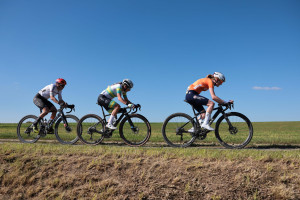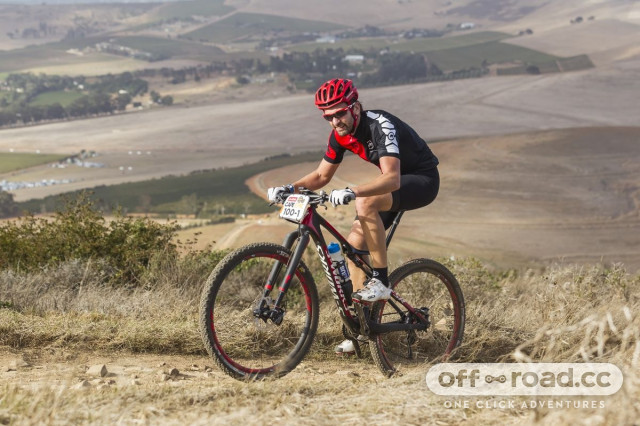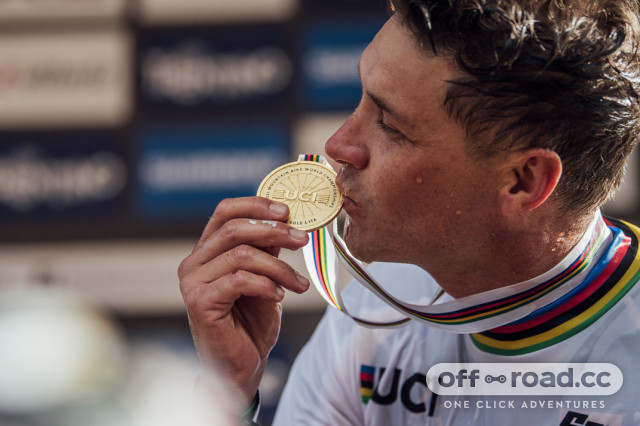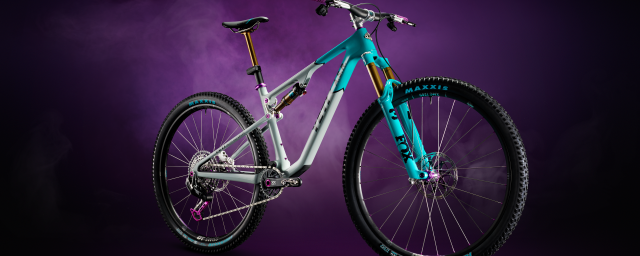UCI unveils new Continental MTB Series with no Asian or African rounds

[Words by Steve Thomas]
On the face of it, cycling on the whole has come a long way in terms of globalisation in recent years – or at least it seems that way if you happen to follow pro/international dropped bar racing.
- Mountain bike racing 2024 - a year in review
- Gravel racing - what's next for cycling's fastest growing discipline?
- Do technical courses make for better cross-country MTB racing?
The road is where the traditional central European dominance has been balanced out by other rising cycling powers – largely western nations and Central American countries, and more recently through the arrival of top-level African road riders – something long awaited and much welcomed in this once white-Eurocentric sport of ours.
Sadly, the same cannot yet be said for mountain biking, where neither Asian riders nor black African racers have broken onto the international circuit in any great numbers. The reasons for this are multiple; lack of opportunity, differing cultures, economics, geography, plus the lack of cycling awareness, history, role models, and infrastructures in many regions, and so much more besides.
Although in certain areas road racing has thrived – on both continents, mountain bike racing has yet to become as popular in Asia in particular.
Geographically Africa is easier to define as a continent than Asia, and it does have superb mountain biking role models, such as Greg Minnaar and Alan Hatherly, which certainly help in driving the sport on the continent.
Asia, on the other hand, is a huge and widely spread continent, one that stretches from the Middle East, through the Stans, across China and Japan, and as far south as Indonesia. Naturally huge cultural and economic differences come with that spread – as they do with Africa. On both of these continents, steps have been taken over the years to help promote cycling and help develop and introduce new riders to the sport, and all credit to those organisations and individuals who have done and are doing this.
Even so, both continents could really use a long leg in terms of mountain biking and its development, and both could probably benefit greatly from the potential opportunities that could be on offer from the hosting of UCI Continental series rounds within reasonable and affordable reach of the racers. Even if the funding of a trip to a World Cup race on the opposite side of the world could ultimately prove impossible for many, surely the opportunity would go a long way towards not only giving these regions a helping hand, but also towards making the sport truly global – and a tad more open than it has been on the global stage.
We realise that implementing and infrastructures for events differ greatly in certain areas of these continents, but there are local events and organisations around that could potentially do the job – and who knows, maybe even a World Cup could take place in Asia one day.
The UCI Continental Series lowdown
This is the basis of the official UCI press release on the series. “So far, these series will consist of twelve events in the Americas (seven Olympic cross-country and five downhill events), nine events in Europe (four Olympic cross-country, four downhill, and one combining both formats), and seven events in Oceania (two Olympic cross-country, four downhill, and one combining both formats).
The introduction of these series was approved by the UCI Management Committee in September in Zurich (Switzerland), as part of the key developments for the mountain bike discipline presented by the UCI in collaboration with Whoop UCI Mountain Bike World Series promoter, Warner Bros. Discovery (WBD) Sports. These changes, set to take effect from 2025, aim to ensure the continued development of the discipline.
Developed in close collaboration with the Continental Confederations, the Continental Series will provide riders from the different continents with new opportunities to qualify for the UCI World Cups, which are part of the UCI Mountain Bike World Series. A rider finishing in the top five of a Continental Series event will be eligible to participate in a round of the UCI Mountain Bike World Series, while the top five riders in the overall standings of the various Continental Series will have the right to participate in all rounds of the UCI Mountain Bike World Series in the following season. These additional opportunities will contribute to the global expansion of the discipline.”
** Although 9 events are mentioned for Europe, so far it seems there are only six confirmed, and there are no listed events in the UK… “That’s all folks.”
We contacted the UCI and others for their thoughts on the new series, and we fully understand that through the festive season, replies can be sparse, though we did hear back from our contacts in Africa on the ommison of the continent from the 2025 Continental Series, and here’s their take on the matter.
Kevin Vermaak - Absa Cape Epic founder
South African Kevin Vermaak is the man that brought us the Absa Cape Epic, an event that put South Africa well and truly on the global mountain bike map, and which has had a huge impact on encouraging, inspiring, and helping African racers and the sport on the continent in general.
Currently, Vermaak is busy laying the foundations for his next great race – Gravel Burn. Despite its limited rider numbers South Africa has long since had standout World Cup racers – both up and downhill, with the current XCO World Champion Alan Hatherly being the latest of these. We asked Vermaak about how he assesses the state of the sport in the country, and about the new UCI Continental series not having a single round in South Africa, or indeed anywhere else in Africa.
Kevin Vermaak; “Mountain biking in South Africa is in a healthy state now, and it continues to grow. However, this has been independent of any stimulus that it might receive from the global mountain bike scene or from the World Cups, and now (not) from the new UCI Continental Series.
This growth is more related to some excellent local events that attract an international audience and field (notably the Absa Cape Epic) and the thousands of amateur riders that love the freedom and safety of riding our thousands of kms of curated single track. This number seems to increase every year through the hard work of passionate landowners.
It must also be one of the very few countries where it’s probably more financially rewarding and easier for the average professional cyclist to earn a living from MTB than on the road. So it is indeed a surprise to me that there are no races on the entire African continent that are part of this new series – we certainly do have quality events and event organisers that could support the circuit.
The reigning UCI MTB World Champion is indeed a South African, and I believe that the main hurdles for more South Africans to join Alan Hatherly in the upper echelons of the sport are, in fact, financial, and through the lack of opportunity to race at this higher level of performance. Perhaps including a few legs of the new series (in Africa) may well have gone a long way to giving more talented Africans (and there certainly seem to be a few on the horizon) a chance to compete a the highest level. Let’s hope the 2025 season is a resounding success and that it can be expanded to Africa in 2026!”
Greg Minnaar - the downhill GOAT
Multiple Downhill Mountain Bike World Champion and World Cup winner Greg Minnaar needs little introduction in mountain biking circles. The lanky and stylish South African races and has topped the global downhill racing bill for more than two decades – and was the first ever African MTB World Champion. At the end of 2024, Greg retired from World Cup racing and will be running the Norco team this season.
Behind the scenes, Greg has also been a long-time member of the UCI Mountain Bike Commission and remains so in 2025. We asked him for an insider’s take on the new Continental Series, and the omission of Africa and Asia from the show in 2025.
Greg Minnaar; “In my opinion, the UCI has tapped into the existing continental series’, such as the IXS Cup in Europe, to form the backbone of the Conti series. This approach leverages established frameworks to enhance regional competitions. If these established series went to Africa or Asia it would detract from a continental series.“
We really hope that the new series will help open up World Cup racing to new riders in the coming year, and hope even more so that it will be extended to become truly global in the near future.















